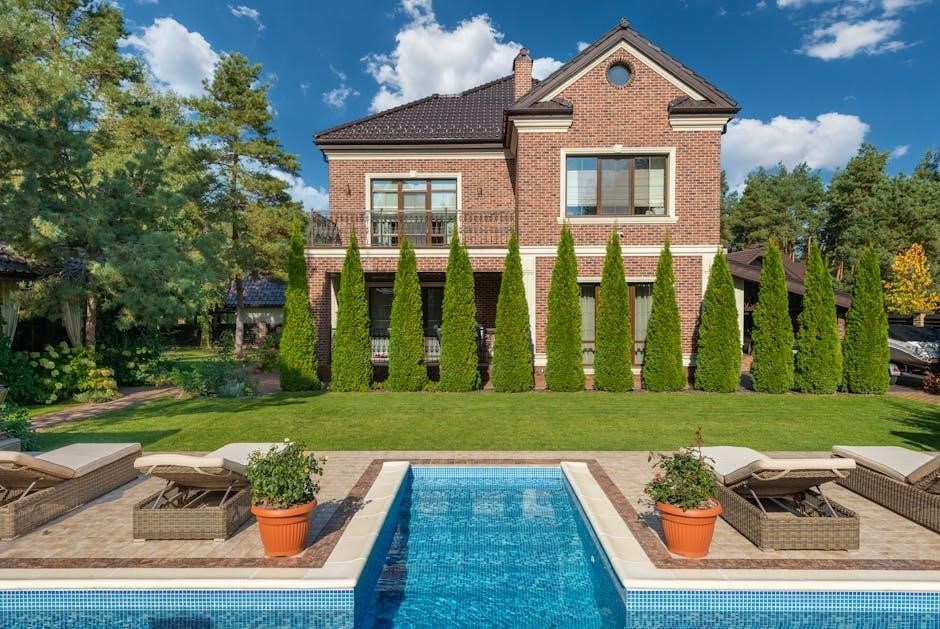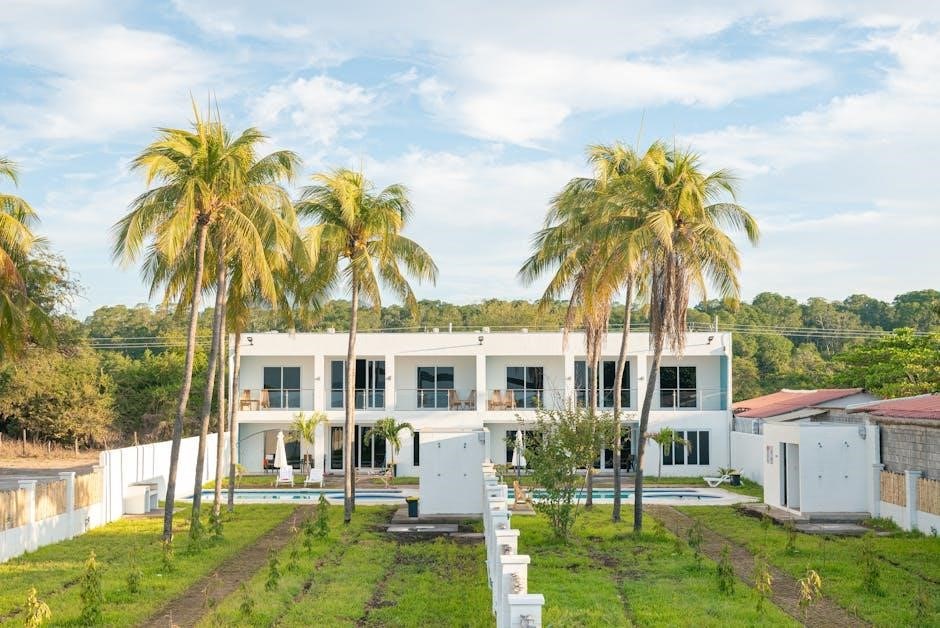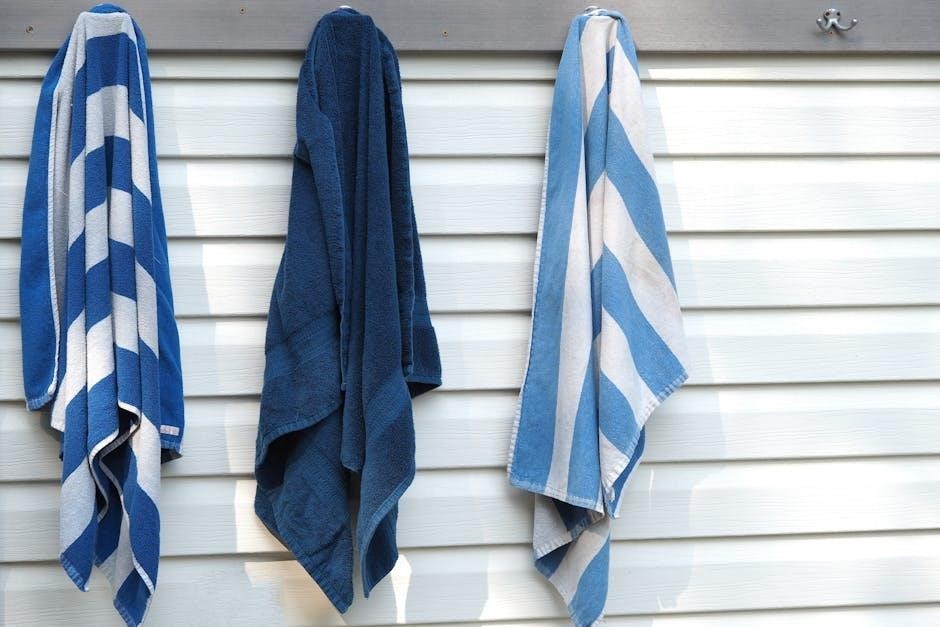Permit Requirements for Residential Pools
In Pennsylvania, a permit is required for residential pools deeper than 24 inches. Applications must include a plot plan showing setbacks and comply with IRC 2009 Appendix G. Pool structures must meet specific safety and barrier requirements, ensuring compliance with the Pennsylvania Uniform Construction Code (PA UCC) and local regulations.
1.1. When a Permit is Required
A permit is mandatory for any residential pool in Pennsylvania with a water depth exceeding 24 inches. This includes in-ground, above-ground, and on-ground pools, as well as hot tubs and spas. Temporary or portable pools meeting this depth requirement also need a permit. The Pennsylvania Uniform Construction Code (PA UCC) and the International Residential Code (IRC) dictate these requirements to ensure safety and compliance. Failure to obtain the proper permit can result in legal consequences and delays in project completion.
1.2. Application Process and Documentation
To obtain a permit for a residential pool in Pennsylvania, applicants must submit a detailed plot plan showing property setbacks and pool location. The plan must comply with the Pennsylvania Uniform Construction Code (PA UCC) and the International Residential Code (IRC). Additional documentation includes pool specifications, barrier and fence plans, and a PA One Call serial number for utility line verification. Applications are reviewed for compliance with safety and zoning regulations before approval. Proper documentation ensures a streamlined process and avoids delays.

Safety Standards and Regulations
Pennsylvania residential pool safety standards require barriers, fences, and gates meeting specific height and latch requirements. GFCI protection for electrical components is mandatory for enhanced safety.
2.1. Barrier and Fence Requirements
Residential pools in Pennsylvania must be surrounded by a barrier at least 48 inches high, preventing a 4-inch sphere from passing through. Fences must be 48 inches above grade, with no gaps exceeding 4 inches. Pool structures can serve as barriers if they meet height and safety standards. Gates must be self-latching and self-closing, with a release mechanism at least 54 inches high. Compliance with PA UCC and IRC standards is mandatory to ensure child safety and prevent accidental drownings.
2.2. Gate and Latch Specifications
Residential pool gates in Pennsylvania must be self-latching and self-closing, with mechanisms at least 54 inches high. Gates should be constructed from durable materials and comply with PA UCC standards. The latches must be secure and positioned out of children’s reach to prevent accidental opening. All gates providing access to the pool area must adhere to these specifications to ensure compliance and enhance safety. They must align with the surrounding fence and barrier system to maintain a consistent and secure enclosure. Regular inspections are recommended to maintain these safety features.
2.3. Pool Covers and Alarms
Pool covers and alarms are critical safety measures under Pennsylvania regulations. Pool covers must meet ASTM standards, ensuring they can support the weight of an adult and prevent accidental drowning. Alarms are required for doors leading to the pool area, with a maximum 20-second delay after opening. Additionally, flotation devices are permitted but are not a substitute for proper barriers or supervision. These measures aim to enhance pool safety and prevent accidents, aligning with PA UCC and IRC guidelines for residential pools.
International Residential Code (IRC) Compliance
Pennsylvania residential pools must comply with the International Residential Code (IRC), specifically Appendix G, ensuring safety standards for pool design, barriers, and equipment installation are met.
3.1. Overview of IRC Standards
The International Residential Code (IRC) provides comprehensive standards for residential pools, focusing on safety, design, and installation. Key requirements include a 48-inch barrier around pools, gate latches, and specific electrical installations. Compliance ensures pools meet safety standards, reducing drowning risks and enhancing overall safety. The IRC also addresses equipment installation, water quality, and structural integrity. These standards are adopted by Pennsylvania and must be followed alongside state-specific regulations to ensure safe and compliant pool construction and operation.
3.2. Specific Provisions for Pools
The IRC specifies that residential pools must have a 48-inch barrier with self-latching gates and no openings larger than 4 inches. Electrical components, such as GFCI-protected outlets, must be installed at least 6 feet from the pool edge. Pool pumps require single GFCI protection, and all wiring must meet IRC standards. These provisions ensure safety, prevent accidents, and align with Pennsylvania’s Uniform Construction Code requirements. Proper installation and regular inspections are mandatory to maintain compliance and ensure safe pool operation.
Pennsylvania Uniform Construction Code (PA UCC)
The PA UCC mandates permits for pools over 24 inches deep, requiring plot plans and compliance with IRC standards. It enforces safety features like fencing and gates.
4.1. Key Provisions of PA UCC
The Pennsylvania Uniform Construction Code (PA UCC) outlines specific requirements for residential pools, including barrier and fencing standards. Pools must be surrounded by a 48-inch-high barrier, with openings no larger than 4 inches in diameter to prevent accidental entry. Additionally, all electrical components, such as pool pumps and lighting, must meet GFCI protection standards. Permits are mandatory for pools exceeding 24 inches in depth, ensuring compliance with safety and structural guidelines. These provisions aim to enhance safety and ensure uniform enforcement across the state.
4.2. Enforcement and Compliance
Enforcement of the Pennsylvania Uniform Construction Code (PA UCC) is managed by local building authorities, ensuring compliance with residential pool regulations. Inspections are conducted by certified professionals to verify adherence to safety and structural standards. Non-compliance results in fines, legal actions, or mandatory corrections. Property owners must address violations promptly and schedule re-inspections to confirm compliance. Strict enforcement ensures public safety and maintains uniformity in pool installations statewide, adhering to both state and local ordinances.
Electrical Requirements
Pennsylvania requires GFCI-protected circuits for pool equipment and surrounding areas. Wiring must comply with IRC standards, ensuring safety and proper installation of electrical components for pools.
5.1. Ground Fault Circuit Interrupters (GFCI)
In Pennsylvania, GFCI protection is mandatory for all pool-related electrical equipment and nearby receptacles. This includes pool pumps, heaters, and lighting systems. GFCI devices must be installed to prevent ground faults, ensuring safety around water. Compliance with National Electric Code (NEC) standards is required. Receptacles within 20 feet of the pool edge must be GFCI-protected. This regulation aims to minimize the risk of electric shock, ensuring a safer environment for pool users. Proper installation and testing of GFCI devices are essential for compliance.
5.2. Wiring and Equipment Standards
All electrical wiring and equipment for residential pools in Pennsylvania must comply with the National Electric Code (NEC). Pool pumps, heaters, and lighting systems require dedicated circuits and GFCI protection. Equipment must be rated for outdoor and wet environments. Proper bonding of metal components is essential to prevent voltage differences. Wiring must be buried at least 12 inches underground or installed in conduit. Regular inspections are required to ensure compliance with Pennsylvania Uniform Construction Code (PA UCC) standards. This ensures safe and reliable electrical systems for pool operations.
Plumbing Requirements
Plumbing for residential pools in Pennsylvania must ensure proper water supply and drainage. Backflow prevention devices are mandatory to protect water quality. Compliance with PA UCC and local codes is essential for safe and efficient pool systems.
6.1. Water Supply and Drainage
Residential pools in Pennsylvania must have a reliable water supply and proper drainage systems. Backflow prevention devices are required to ensure water quality and safety. Drainage systems must be designed to prevent contamination of groundwater and nearby waterways. Pool pumps and filtration systems should be installed according to manufacturer specifications and PA UCC guidelines. Proper sizing of pipes and valves ensures efficient water circulation. Regular inspection of drainage outlets and skimmers is essential to maintain system performance and compliance with local regulations.
6.2. Backflow Prevention Devices
Backflow prevention devices are essential for Pennsylvania residential pools to prevent contamination of potable water. These devices must be installed on all pool water supply lines and tested annually by a certified technician; Compliance with PA UCC standards is mandatory, ensuring proper installation and function. Regular inspections are required to maintain certification and ensure public health safety. Properly functioning backflow devices safeguard the community water supply from potential hazards associated with pool systems.
Installation Guidelines
A plot plan showing all setbacks must be submitted for pool installation. Compliance with International Residential Code (IRC) standards is mandatory for site preparation and excavation.
Ensure proper installation of barriers, fencing, and gates according to PA UCC guidelines. All work must comply with local building codes and safety regulations.
7.1. Site Preparation and Excavation
Site preparation for residential pools in Pennsylvania requires a submitted plot plan showing all setbacks and property lines. Excavation must comply with PA UCC and IRC standards. A 48-inch barrier is mandatory, and openings must prevent a 4-inch sphere from passing through. Proper drainage systems must be installed to prevent water accumulation. Utility lines should be marked beforehand, and PA One Call must be notified. All work must adhere to local building codes and safety regulations to ensure compliance and inspections pass successfully.
7.2. Equipment Installation Best Practices
Equipment installation for residential pools in Pennsylvania must comply with PA UCC and IRC standards. Pool pumps and heaters require GFCI-protected receptacles, with convenience receptacles placed 6-20 feet from the pool. All electrical equipment must be bonded and grounded properly. Pumps and heaters should be sized correctly for pool volume and usage. Regular inspections of equipment and connections are essential. Proper installation ensures safety, efficiency, and compliance with local building codes. Always follow manufacturer instructions and consult licensed professionals for complex setups to meet regulatory requirements and ensure system longevity.

Maintenance and Upkeep
Regular cleaning and inspections are essential to maintain pool safety. Proper chemical balance ensures water quality. Adhere to PA UCC standards for ongoing upkeep and compliance.
8.1. Regular Cleaning and Inspection
Regular cleaning and inspection are crucial for maintaining pool safety and functionality. Pennsylvania regulations emphasize the importance of skimming, vacuuming, and checking filtration systems. Pool owners must ensure all barriers and gates are inspected for damage or wear. Chemical levels should be tested frequently to maintain water quality. Proper documentation of inspections is recommended to ensure compliance with PA UCC standards. Regular upkeep prevents hazards and extends the lifespan of the pool. Stay informed about local codes to avoid violations.
8.2. Chemical Safety and Water Quality
Proper chemical safety and water quality are essential for residential pools in Pennsylvania. Pool owners must maintain appropriate chlorine and pH levels to ensure safe swimming conditions. Regular testing of water chemistry is required to prevent health risks. Chemical storage and handling must comply with safety guidelines to avoid accidents. Improper chemical use can lead to violations of PA UCC standards. Always follow manufacturer instructions and local regulations for chemical application. Clean and clear water ensures a safe and enjoyable swimming environment for everyone.

Local Zoning Laws
Local zoning laws in Pennsylvania require residential pools to comply with property setbacks and easement regulations. A plot plan must show all required distances from property lines.
9.1. Setback Requirements
In Pennsylvania, residential pools must adhere to local zoning setback requirements. Pools typically need to be at least 10 feet away from property lines and 5 feet from the house. These setbacks ensure compliance with safety and spatial regulations. Local ordinances may vary, so it’s essential to verify specific requirements with your municipality. Proper setbacks help prevent encroachments and maintain neighborly property relations. Always consult local zoning authorities to confirm distances and avoid violations.
9.2. Property Line and Easement Considerations
Residential pools in Pennsylvania must not encroach on property lines or easements. Pools are typically required to be at least 10 feet away from property lines to avoid disputes or violations. Easements, such as utility or drainage rights-of-way, must also be respected; Encroaching on these areas can lead to legal issues and non-compliance with local zoning laws. Always verify property boundaries and easement locations before installation. Consulting with local zoning authorities ensures adherence to these regulations and prevents potential conflicts with neighbors or utility providers.

Environmental Regulations
Pennsylvania requires proper water disposal and stormwater management for residential pools to prevent environmental contamination. Compliance with state and local drainage regulations is mandatory to ensure ecological safety.
10.1. Water Disposal and Drainage
In Pennsylvania, residential pool water disposal must comply with environmental regulations. Draining pool water into waterways requires a permit under the Clean Streams Law. Outdoor pools must have proper drainage systems to prevent contamination of nearby water sources. The Pennsylvania Uniform Construction Code (PA UCC) mandates backflow prevention devices to safeguard potable water supplies. Additionally, stormwater management systems must be implemented to handle runoff and erosion effectively, ensuring ecological protection and public health safety.
10.2. Stormwater Management
Pennsylvania requires residential pools to incorporate stormwater management systems to prevent erosion and protect water quality. Proper drainage systems must be designed to handle runoff from pool areas, ensuring compliance with local regulations. The Pennsylvania Uniform Construction Code (PA UCC) mandates erosion control measures during and after construction. Stormwater discharge into waterways must adhere to the Clean Streams Law, prohibiting untreated or contaminated water release. These regulations aim to safeguard aquatic ecosystems and maintain public health standards.

Federal Regulations
Federal regulations, including the Virginia Graeme Baker Pool and Spa Safety Act, mandate drain safety measures. The Americans with Disabilities Act (ADA) ensures accessibility for public pools.
11.1. Virginia Graeme Baker Pool and Spa Safety Act
The Virginia Graeme Baker Pool and Spa Safety Act mandates safety measures to prevent drowning and drain entrapment. It requires pools to install anti-entrapment drain covers and comply with federal standards. Residential pools in Pennsylvania must adhere to this law, ensuring safer environments, especially for children. The act emphasizes proper installation and maintenance of safety equipment, aligning with Pennsylvania’s construction codes to enforce compliance and reduce risks associated with pool accidents.
11.2. ADA Compliance for Public Pools
Public pools in Pennsylvania must comply with the Americans with Disabilities Act (ADA), ensuring accessibility for individuals with disabilities. This includes installing pool lifts or transfer systems, providing grab bars, and maintaining accessible pathways. Residential pools open to the public are also subject to these requirements, promoting equal access and safety for all users. Compliance ensures that facilities meet federal standards, fostering inclusivity and preventing discrimination in recreational spaces.
Deck and Surround Requirements
Decks and surrounds must be made of durable, slip-resistant materials. The deck must be at least 48 inches wide around the pool, ensuring safe access and drainage.
12.1. Material Specifications
Deck and surround materials must be durable and slip-resistant, such as concrete, stone, or brick pavers. All materials should comply with the Pennsylvania Uniform Construction Code (PA UCC) and IRC standards, ensuring safety and longevity. Proper installation and finishing techniques are required to prevent slipping hazards. The materials must also allow for adequate drainage and withstand harsh weather conditions. Compliance with these specifications ensures a safe and functional pool area, meeting both local and international residential codes.
12.2. Slip-Resistance and Drainage
Deck surfaces must be slip-resistant and designed to prevent water accumulation. Materials such as textured concrete, stone, or brick pavers are recommended. Proper drainage systems, like sloped surfaces and catch basins, ensure water runoff. The PA UCC requires compliance with IRC standards for slip-resistance and drainage, ensuring a safe environment around pools. These features minimize accident risks and maintain a functional, well-drained pool area, adhering to both local and international residential codes for safety and durability.
Fence Requirements
In Pennsylvania, residential pools require a 48-inch-high fence with openings no larger than 4 inches. Fences must be durable, constructed from approved materials, and fully enclose the pool area to prevent accidents and ensure safety.
13.1. Height and Material Standards
In Pennsylvania, residential pool fences must be at least 48 inches tall, constructed from durable materials like wood, metal, or vinyl. The fence must fully enclose the pool area, with no gaps or openings larger than 4 inches. Materials must be weather-resistant and capable of withstanding outdoor conditions. The fence should be designed to prevent unauthorized access and ensure safety. Compliance with these standards is essential to meet PA UCC requirements and local building codes, ensuring a secure and safe pool environment.
13.2. Gate and Latch Safety Features
Pennsylvania requires pool gates to be at least 48 inches tall, constructed from durable materials like wood, metal, or vinyl. Gates must be self-closing and self-latching, with latches positioned at least 54 inches high to prevent child access. Gates should open outward and have no gaps exceeding 4 inches. These features ensure compliance with PA UCC standards, enhancing pool safety and preventing unauthorized entry. Proper installation and maintenance of these safety mechanisms are crucial for protecting children and adhering to local regulations.

Inspections and Enforcement
Inspections are mandatory to ensure compliance with PA UCC and local pool safety standards. Enforcement involves verifying barrier, gate, and safety feature requirements to prevent non-compliance penalties.
14.1. Inspection Process and Frequency
Inspections for residential pools in Pennsylvania are conducted by local authorities to ensure compliance with the PA UCC and safety standards. The process involves checking barriers, gates, fencing, pool equipment, and electrical systems. Inspections typically occur during installation and before final approval, with periodic follow-ups to maintain compliance. Enforcement actions are taken if violations are found, emphasizing the importance of adhering to regulations to avoid penalties.
14.2. Consequences of Non-Compliance
Non-compliance with Pennsylvania residential pool regulations can result in fines, legal actions, and mandatory corrective measures. Property owners may face penalties for failing to meet safety standards or permitting requirements. Enforcement actions could include orders to cease use of the pool until compliance is achieved. Repeat violations may lead to escalated penalties or even revocation of permits. It is crucial to address compliance issues promptly to avoid these consequences and ensure a safe environment.
Penalties for Non-Compliance
Non-compliance with Pennsylvania pool regulations may result in fines and legal actions. Property owners face penalties for violating safety standards or permit requirements, ensuring accountability and compliance.
15.1. Fines and Legal Actions
Violations of Pennsylvania residential pool regulations can result in significant fines. Non-compliance may lead to monetary penalties ranging from $500 to $5,000 or more, depending on the severity. Local authorities enforce these fines, and repeat offenses may escalate legal actions. Property owners may face lawsuits or injunctions compelling compliance. Legal actions aim to ensure public safety and adherence to regulations. Failure to address violations can result in further legal consequences, emphasizing the importance of full compliance with pool safety standards and permit requirements.
15.2. Corrective Measures and Re-inspection
Property owners must address violations by implementing corrective measures to achieve compliance with pool regulations. Upon making necessary adjustments, a re-inspection request is required. The process involves submitting updated plans or repairs for approval. Re-inspections ensure all safety standards, such as fencing, gates, and electrical systems, are met. Additional fees may apply for repeated inspections. Failure to correct violations may result in further legal action, emphasizing the importance of timely compliance with Pennsylvania residential pool regulations.

Additional Resources
Key resources include the PA Department of Labor & Industry publications and local building authorities for detailed guidelines and compliance assistance. Specific PDF documents and contacts are available online.
16.1. PA Department of Labor & Industry Publications
The Pennsylvania Department of Labor & Industry provides comprehensive publications on residential pool regulations. These include detailed guidelines on permit requirements, safety standards, and installation practices. The documents outline compliance with the PA Uniform Construction Code and the International Residential Code (IRC). They also cover specific provisions for pool barriers, electrical systems, and water quality. These resources are available online in PDF format, offering homeowners and contractors a clear reference for ensuring compliance with state and local regulations. Access these publications through the official PA Department of Labor & Industry website.
16.2. Local Building Authorities and Contacts
Local building authorities in Pennsylvania provide essential resources for residential pool regulations. They offer guidance on permits, inspections, and compliance with local codes. Homeowners can access detailed information through local government websites or by contacting municipal offices. Many jurisdictions, like Philadelphia’s Department of Licenses and Inspections, provide specific requirements for pool installations. These authorities ensure adherence to both state and local standards, offering tailored support for compliance with pool safety and construction regulations in their respective areas.
Installing a residential pool in Pennsylvania requires adherence to specific regulations. From permit requirements to safety standards, compliance with the PA UCC and IRC is essential. Proper fencing, barriers, and electrical installations ensure safety. Regular maintenance and inspections are crucial for long-term enjoyment. Homeowners must consult local building authorities to navigate the process smoothly. By following these guidelines, residents can create a safe and enjoyable swimming environment while meeting all legal and safety standards in Pennsylvania.
